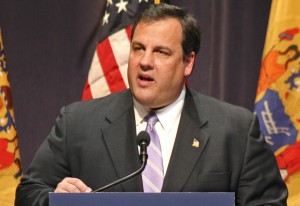Gov. Christie, Ronald Reagan, Woodrow Wilson and God’s Call
 New Jersey Governor Chris Christie is being urged to seek the Republican presidential nomination. There is a genuine groundswell for Christie.
New Jersey Governor Chris Christie is being urged to seek the Republican presidential nomination. There is a genuine groundswell for Christie.
Asked [last] week at the Reagan Library whether he will enter the race, Christie gave a very interesting answer. Citing the example of Ronald Reagan, he stated: “I know, without ever having met President Reagan, that he must have felt deeply in his heart that he was called to that moment, to lead our country.”
Christie seemed to say that, unlike Reagan, he isn’t feeling a call to enter the presidential race. That’s a telling statement that merits unpacking.
For Reagan, the call in his heart came from himself, from his country, and from his sense of God’s will. I imagine that Christie, likewise a religious man, is seeking a call from those same sources.
Well, as the guy who wrote the book on Ronald Reagan’s faith, perhaps I can help out Christie here.
It is correct to say that Reagan felt called by God. But Reagan’s thinking was always more complicated than that. Ronald Reagan spoke constantly, throughout his career, of what he and his close friend and colleague Bill Clark (who had been with Reagan since the California gubernatorial years) called “the DP”—i.e., the Divine Plan. Reagan prayed to discern God’s will, but he knew that discernment is a tricky business. He was happy to place his life and career in “God’s hands,” not knowing where precisely, and when, that would lead him. To cite just one example of many, Reagan felt a call of some sort in 1976, but lost his presidential bid that year. When he lost, he told his family and friends that the loss must have been God’s will.
Reagan felt that only in retrospect could one (better) detect God’s intent. He learned this as a boy from his mother. It never left him.
“God had another plan,” Reagan later put it. That plan, that divinely laid “fork in the road” that his mother always talked about, apparently included winning the presidency in November 1980, getting shot in March 1981, taking on the Evil Empire, standing at the Berlin Wall, meeting with Gorbachev and Pope John Paul II and Thatcher and Walesa, and on and on.
What Reagan possessed was a strong sense of good vs. evil, right and wrong, and, most significant of all, recognition of the need to respond to a nation (or at least a political party) that was calling him.
Gov. Christie and his fellow Republicans and conservatives would agree that, in Reagan’s case, things worked out for the best, just as Reagan’s mother always said they would—in “God’s time,” and according to “the DP.”
Now, contrast this lesson to that of another New Jersey governor, another presidential candidate, from precisely 100 years ago—with an amazingly similar trajectory to Christie’s. Newly elected New Jersey Governor Woodrow Wilson, a Democrat and progressive’s progressive, had been governor for only one year in 1912. Suddenly, he was being pursued by his party to seek the presidency and dislodge the Republican incumbent from the White House. In a wide open race, Wilson was poised to persevere.
Wilson, a devout five-point Calvinist with a superb command of Reformed theology and an unwavering belief in predestination, never shied from confidently interpreting God’s will. Modern secular liberals neglect that this progressive icon had an extremely rigid perception of the hand of Providence, of being “chosen.” He was adamant that he could accurately construe God’s plan, whether as president of Princeton, governor of New Jersey, president of the United States, or author of the League of Nations—the latter of which, Wilson believed, was God’s intent and he was God’s instrument to make it happen. Anyone who opposed Wilson in his religious sureness was judged a malefactor working against God’s resolve.
In 1912, Woodrow Wilson concluded that God wanted him to be president.
Would today’s conservatives, who strongly dislike Wilson, agree that Wilson was right in seeing God’s hand guiding him? Would Gov. Christie agree that Wilson had correctly answered a direct call from God?
Conservatives would beg to differ. (Would liberals?) As for me, I won’t hazard a guess.
My point, however, is that some leaders feel a call—particularly from Divine Providence—and some do not. What may be most important for a leader is to respond to the call of leadership when he feels a nation is hungering for it and for him. Governor Christie may not ever feel a call from God to be president. But he may be getting a call from his party and from America. And that may be the voice he needs to heed right now.

